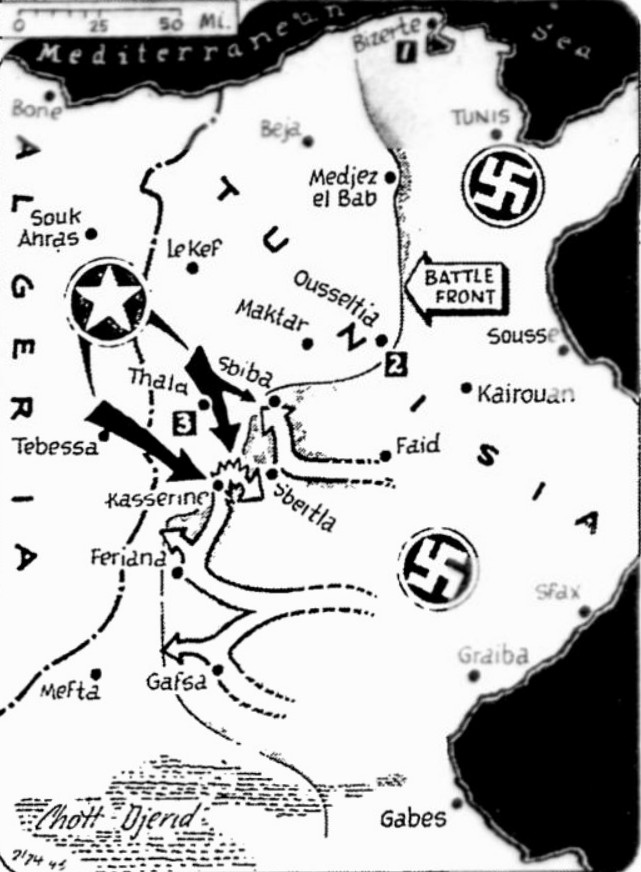The Pittsburgh Press (February 23, 1943)
Roving Reporter
By Ernie Pyle
The Tunisian front – (Feb. 22)
After a few weeks of frontline living, your whole perspective on the niceties and necessities of life change.
You used to be sore when you couldn’t get a taxi. Now you’ve struck gold when you find a spot where you can lie down out of the wind.
Even my own perspective has changed, and as a correspondent I’ve had only the barest taste of the rough going. For a lifetime I have bathed with becoming regularity, and I thought the world would come to an end unless I changed my socks every day. Now I have just had my first bath in a month, and I go two weeks at a time without even taking off my socks. Oddly enough, it doesn’t seem to make much difference.
The other day, I had to laugh at myself over a little emotion I experienced. We had arrived one evening at a new frontline headquarters. It was centered around a Tunisian farmhouse, as practically all command posts were. Soldiers and officers alike were sleeping just anywhere they could – in trucks, under trees, in the barn and chicken houses. It was cold and damp, as usual.
Nobody tells a correspondent where to sleep or what to do when he is gypsying around the front. He shifts for himself. So I nosed around and found a place to sleep. It was under a big French grain wagon sitting in the barn lot. Some soldiers had found several strips of corrugated tin roofing and set them around three sides of the wagon, making walls. The wagon bed formed a roof overhead. They had brought straw from a nearby stack and put it on the ground under the wagon. There we threw our bedding rolls.
It was the coziest place I’d slept in for a week. It had two magnificent features – the ground was dry, and the wind was cut off. I was so pleased at finding such a wonderful place that I could feel my general spirits go up like an elevator. When the detachment got orders to move the next day, I felt a genuine regret at leaving this little haven. And to think after all it was only some pitiful straw on the hard ground under a wagon.
As we were going to bed that night, Hal Boyle of the Associated Press, who was sleeping next to me, said:
I believe that in wartime your physical discomfort becomes a more dominant thing in life than the danger you’re in.
And I believe that’s true. The danger comes in spurts; discomfort is perpetual. You’re always cold and almost always dirty. Outside of food and cigarettes, you have absolutely none of the little things that made life normal back home. You don’t have chairs, lights, floors, or tables. You don’t have any places to set anything, or any store to buy things from. There are no newspapers, milk, beds, sheets, radiators, beer, ice cream or hot water. You just sort of exist, either standing up working or lying down asleep. There is no pleasant in-between. The velvet is all gone from living.
It doesn’t get much below freezing here in central Tunisia, but you must believe me when I say we all suffer agonies from the cold. Any soldier will back me up.
The days are sunshiny, and often really warm, but the nights are almost inhuman. Everybody wears heavy underwear and all the sweaters he can find, plus overcoat and gloves and knitted cap. And still he’s cold. We have snow on the mountains here.
The soldiers somehow resent the fact that so many of you folks at home just think because we’re in Africa that we’re passing out with the heat. Any number of soldiers have showed me letters from their families full of sympathy because of the heat prostrations they must be suffering.
Soldiers ask me for Heaven’s sake to get over to the folks at home that Africa in winter is frigid. I’ll tell you, in one little incident, just how cold it is. And also how little money means compared to bodily necessities.
When not traveling around the fronts, I’m living in a small igloo tent among fir trees at a certain forward camp. There I hole up for days at a time to write these columns. The tent is fine except that there’s no heat in it and no way to get any heat.
So the other day, along the road, I ran into a soldier in a half-truck who had a kerosene stove – the old-fashioned kind they used to heat the school with, you know, I offered him $50 for it – back home it would be worth about $3.
He didn’t hesitate a second. He just said, “No sir,” and that was the end of that.
It would have been just the same if I’d offered him $500. He couldn’t use the money, and without the stove he’d be miserable.
Now do you see how things are different over here with us?


